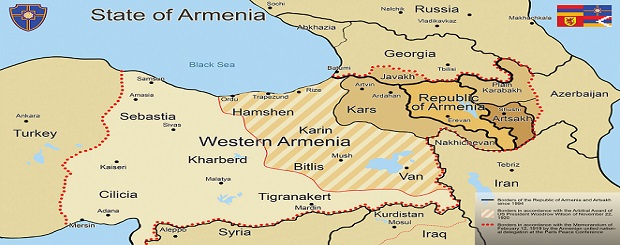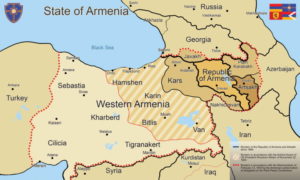
Stanislav Tarasov: “Isn’t it time to prepare for the denunciation of the Moscow and Kars Treaties?” Turkey could become Yugoslavia.
August 20, 2017 – Source: Regnum:
The president of the Organization of Turkish Reserve Officers, retired Lieutenant-General Erdogan Karakush, declared that “the independence of Kurdistan is not beneficial for Armenia”. According to him, “Armenia has never parted from the dream of creating the mythical” Great Armenia “. According to Karakush, “if, following the referendum, Kurdistan becomes an independent state, this will create disadvantages for Armenia”, because “the appearance of Kurdistan on the map can overturn the aspirations of Armenians to create the” Great Armenia “because the Kurds and Armenians aspire to eastern Turkey”.
We will make important clarifications. The leadership of the Iraqi Kurdish Autonomous Region, despite opposition from the central government in Baghdad, “mild” objections from the United States and some of its Western allies, open protests from Turkey and Iran will organize an independence referendum on September 25. So far, it is not a question of creating a “Greater Kurdistan”, but only an independent Kurdish state in the north of Iraq. And this project is closer than ever to practical implementation, which, of course, stimulates the Kurdish movement across the Middle East.
According to experts from the Central Asia Monitor research center, in addition to Iraq, before the start of the “Arab Spring” and the Syrian crisis, “the conditions for the political and other struggle of the Kurds only matured in Turkey” . Consequently, Ankara first tried to flirt with “its” Kurds, but was slow to implement major economic, political and administrative-territorial transformations in the south-east of the country. And when Syrian President Bashar al-Assad, at the start of the crisis in the country, granted extensive rights to the Syrian Kurds, it pushed Ankara into “Kurdish ticks” between Iraq and Syria. As a result, neighboring and friendly Kurdish forces have started the process of amalgamation, which is becoming a threat to the Turkish state.

Paradoxically, the emergence in the region of ISIS (an organization whose activities are banned in the Russian Federation) has further updated the Kurdish problem. In this regard, many Turkish experts, representatives of the military circles have begun to openly express their concerns about the prospects for the existence of Turkey within its current borders, highlighting two serious foreign policy errors of the ruling party, the Party of Justice and Development, headed by Turkish President Recep Tayyip Erdogan.
First: during the Iraq War of 2003, for the first time after the signing of the Treaty of Lausanne on July 24, 1923, Turkey adopted the American provision, according to which the Kurdish movement began to act as a political actor and independent geopolitics in the Middle East.
Second: Ankara took an active part in the so-called “Arab revolutions”, guided by the objectives proposed by the West. The fact that Erdogan believes that he alone will succeed in weakening the Kurdish unity in Turkey and abroad on Kurdish geopolitical questions is not justified. The potential formalization – following Iraqi Kurdistan – even of the autonomy of the Kurds in Syria (and in the future, unification with Iraqi Kurdistan as an independent state) could be a serious step towards the revision of the drawn borders. by the Lausanne world.
Now the Turkish media are already discussing the issue of the absence of fixed borders for Greater and Lesser Kurdistan and a unified Kurdish ethnic identity. In this context, the president of the Organization of Turkish Reserve Officers, retired Lieutenant-General Karakush, decided to recall the Great Armenia project, ensuring that the emergence of an independent Iraqi Kurdistan would not only create “disadvantages for Armenia”, but would also lead to Armenian-Kurdish problems. in eastern Turkey, which Armenia “considers its territory”. The bottom line here is that Ankara has started to think of the possibility of playing the Armenian “card” as “lesser evil” than the possibility of forming a Kurdish state in Turkey itself.
On a practical level, the expected course of events may mean, on the one hand, the normalization of Turkish-Armenian relations, and on the other hand, the will to recognize the Moscow and Kara agreements with Ataturk, which determined that the borders of the three countries of the South Caucasus and Turkey were not valid. After that, the problem of the borders of the supposed independent Greater Kurdistan and Turkey with the Transcaucasian countries can be resolved at the Turkish-Kurdish-Transcaucasian level. Finally, thirdly, it cannot be excluded that the West will launch an information campaign “on the true friends of the Armenian people” to destroy Armenian-Russian relations in order to leave Yerevan without Moscow’s help.
In fact, Turkey can gradually transform into a new Yugoslavia. According to the Turkish newspaper Yeni Çağ, “Turks are forced to get used to the fact that for them the Middle East can end in Gaziantep (a city in southern Turkey – S.T.)”. In the meantime, Turkey, having lost all its allies, is forced to conclude an alliance with Russia and Iran in the Syrian sense, not wanting to break completely with the United States. But the process of creating an “independent Kurdistan” has already been launched, the question is how, with whom and under what flag it will go further.
Stanislav Tarasov
August 20, 2017
Source: Regnum
